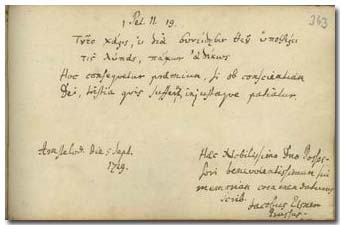
1. Pet. II. 19.

Hoc consequetur praemium, si ob conscientiam Dei, tristia quis
sufferat, injustaque patiatur. Haec
Nobilissimo D[omi]no Possessori benevolentissimam sui memoriam
commendaturus scrib[ebat]
Jacobus Elsner Prussus
Amstelod[ami] die 5 Sept. 1719.
|
* 1Pet 2:19. Vulgate: “haec est enim
gratia si propter conscientiam Dei sustinet quis tristitias
patiens iniuste”.
|
|
|
|
For this is thankworthy, if a man for conscience toward God endure
grief, suffering wrongfully. 1Pet 2:19. *
With this I recommend myself into the memory of
the noble owner [of this album],
the Prussian Jakob Elsner
In Amsterdam, on September 5, 1719.
|
p. 363. Amsterdam, September 5, 1719
Elsner, Jakob
(1692-1750), German Reformed
theologian
Jakob Elsner was born in March 1692 in Saalfeld, in a well-off
bourgeois family. His father Georg Elsner had come from Bohemia,
and wanted his son to be a merchant. Jakob learned in Saalfeld,
then he went to Königsberg to study oriental languages. From 1715
for two years he was subrector of the local Reformed school, and
court pastor of Count Alexander zu Dohna. In 1717 he went to the
Netherlands, and immatriculated at the University of Utrecht. He
studied Biblical hermeneutics and antiquity, and won a fame. In
1720 the Prussian King Frederick William I (1688-1740) appointed
him professor of theology and oriental languages at the academy of
Lingen in Westfalen, while the local church elected him pastor.
His inaugural address was awarded doctoral title in Utrecht. In
1722 he was invited to Berlin as a rector of the high
school of Joachimstal, for restoring order and discipline. Having completed this
job, he worked as a member the ecclesiastical council and a
supervisor of the school, and later he was elected a member of the
supreme council of all the Reformed communities. After the death
of Johann Daniel Schmidmann (1663-1728) he was elected second
pastor, then first pastor of the Reformed community. From 1742 he
was director of the department of liberal arts at the Learned Society in Berlin, and at its successor in right, the Royal
Academy of Sciences. He died on October 8, 1750 in Berlin. He
published his sermons; among his scientific works his book of 1737
exerted an enduring influence. His works are:
De lege Mosis per angelos data. Leiden, 1719. – Oratio inauguralis de Zelo Theologi, dicta in illustri Athenaeo
Lingensi d. 9. Jan. 1721. Utrecht, 1721. – Oratio
inauguralis de eruditione cum pietate coniungenda. Berlin,
1722. – Observationes sacrae in Novi Foederis libros, tom.
I, II. Utrecht, 1720, 1728. – Die grosse Glückseeligkeit der
wahren Christen: in einigen Predigten über ausserlesene Texte
vorgestellt. Berlin, 1729. – Neueste Beschreibung derer
Griechischen Christen in der Türckey: aus glaubwürdiger Erzehlung
[!] Herrn Athanasius Dorostamus, Archimandriten des Patriarchen zu
Constantinopel … mit neuen Zeugnissen der berühmtesten
Nachrichten … Berlin, 1737.
Jakob Elsner wrote in the album his consoling quotation in
September of 1719, while in the Netherlands. He only squeezes in
under his signature: Prussian (“Prussus”). Johann Daniel
Schmidmann, who will be followed at the parochy of Berlin by
Elsner, received Ferenc Pápai Páriz six years earlier in Berlin,
and wrote in his album (p. 141).
•
ADB • AlbUtr 119 • Jöcher-Adelung • Krollmann 163 • Michaud |

